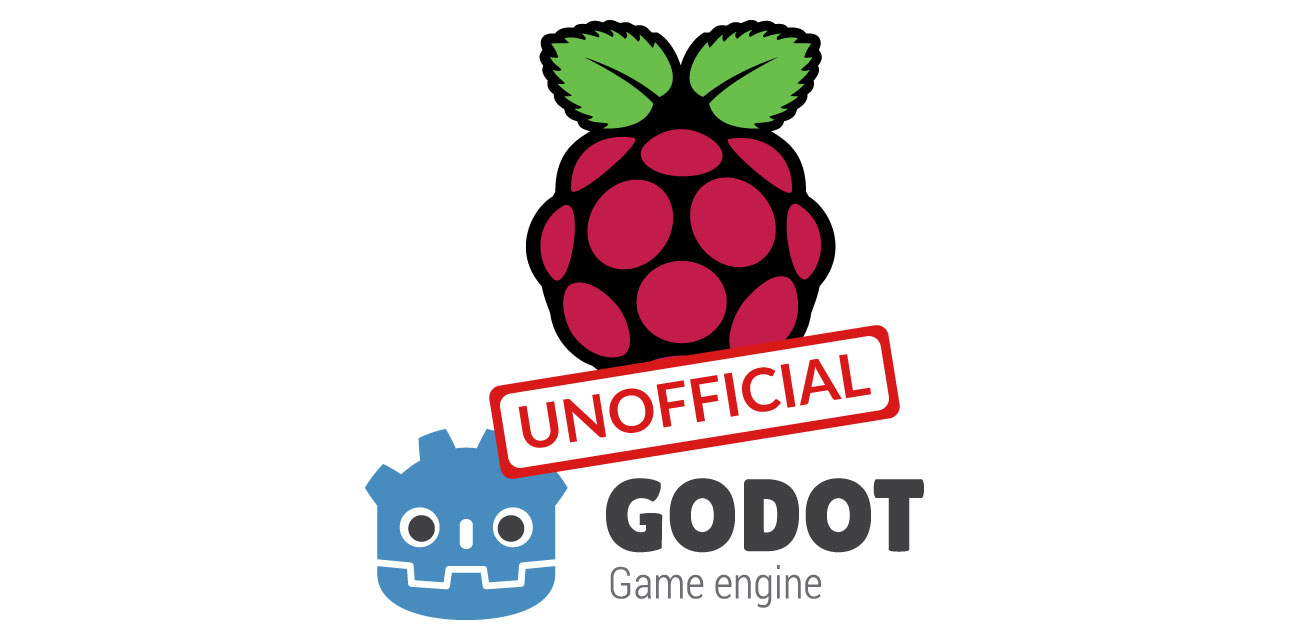Unofficial Godot Engine binaries for the Raspberry Pi.
- The Raspberry Pi only supports GLES2.
- The Raspberry Pi doesn't support GPU particles, only CPU particles.
- We don't have
3.0.6binaries because it doesn't have GLES2 support, only GLES3. - We don't have
headlessandserverbinaries for2.1.6. We can compile them on the Raspberry Pi. - If the export templates from this repository don't work, you can try the ones from FRT: a Godot "platform" targeting single board computers, which offers support for multiple Raspberry Pi revisions and other single-board computers and are well tested.
- We don't offer any kind of support. The binaries are distributed as-is 🙃.
If you would like official Godot support for the Raspberry Pi, there is a proposal about it. Go there and give us a thumbs up so we can get it 👍 😉 !
- Compiling
- Status
- Downloads
- How to launch the Editor
- How to export a game using the Export Templates
- How to export an independent PCK file
- How to run a game
- Troubleshooting
See COMPILING.
This table refers to the Raspberry Pi 4 only. Prior version are untested.
| 2.1.6 | 3.1.2 | 3.3.4 | 3.4.5 | 3.5.2 | |
|---|---|---|---|---|---|
| Editor | ✓ | * | ✓ | ✓ | ✓ |
| Export template | ✓ | ✓ | ✓ | ✓ | ✓ |
| Headless | - | ✓ | ✓ | ✓ | ✓ |
| Server | - | ✓ | ✓ | ✓ | ✓ |
- ✓: Works perfectly.
*: It works, but it's laggy/unresponsive at fullscreen (1920x1200). Making the editor 1/2 or 1/3 of that size makes it run better.-: Not available.
Each ZIP file contains: Editor, Export template, Headless and Server.
These ZIP files only contain: Editor and Export template.
To open the editor, run:
./godot_x.x.x_rpi4_editor.bin
(where x.x.x is the version of Godot).
You might need to give executable permissions to the binary. If that's the case, run:
sudo chmod +x godot_x.x.x_rpi4_editor.bin
You don't have to use a Raspberry Pi to export a game for it. You can use any computer running any OS supported by Godot.
- In the editor, go to
Export. - Select the
Linux/X11template. - In
Debug, uncheckDebugging Enabled. - In
Custom Binary -> Release, select the version of the export template that matches the version of your project. - In
Binary, uncheck64 bits*. - Click
Export. - You can use the
.rpi4extension when naming the exported game.
* Only for 32 bits binaries.
- In the editor, go to
Project -> Export. - Select the
Linux/X11template. - In
Binary Format, uncheck64 bits*. - In
Custom template -> Release, select the version of the export template that matches the version of your project. - Click
Export Project. - Uncheck
Export With Debug. - Optionally, after the game is packed, you can rename the extension of the game's executable binary from
.x86to.rpi4to avoid confusion.
* Only for 32 bits binaries.
You can export a .pck file and run it with the export templates from this repository.
- In the editor, go to
Export. - Select the
Linux/X11template. - In
Binary, uncheck64 bits*. - Click
Export PCK/ZIP. - Enter the name of your game with the
.pckextension. - Click
OK.
* Only for 32 bits binaries.
- In the editor, go to
Project -> Export. - Select the
Linux/X11template. - In
Binary Format, uncheck64 bits*. - Click
Export PCK/ZIP. - Uncheck
Export With Debug. - Enter the name of your game with the
.pckextension. - Click
Save.
* Only for 32 bits binaries.
- The is no
.pckfile (meaning that it's embedded in the executable binary). - The
.pckfile has the same name as the executable binary and they are both in the same directory.
You can just run the executable binary, like this:
./name_of_your_godot_game.ext
- The
.pckfile has a different name than the executable binary. - The
.pckfile is in a different directory than the executable binary. - You are using an independent
.pckfile (without an executable binary).
You'll have to pass the .pck file's path using the --main-pack option, like this:
./godot_x.x.x_rpi4_export-template.bin --main-pack "/path/to/the/pck/file.pck"
On Godot 2.x, use -main_pack instead of --main-pack.
If the game you are trying to play doesn't work, it will most likely be because it was made with another version of Godot.
It could also be because it uses GDNative or C#, which the Raspberry Pi binaries doesn't support.
If you get this error when trying to play a game:
Your video card driver does not support any of the supported OpenGL versions. Please update your drivers or if you have a very old or integrated GPU upgrade it.
It means that the game you are trying to run uses the GLES3 video driver, which the Raspberri Pi doesn't support.
You'll have to force Godot to use the GLES2 video driver by passing the --video-driver GLES2 parameter, like this:
./godot_x.x.x_rpi4_export-template.bin --main-pack "/path/to/the/pck/file.pck" --video-driver GLES2
On Godot 2.x, use -vd instead of --video-driver.
See CHANGELOG.
- hiulit
Feel free to:
- Open an issue if you find a bug.
- Create a pull request if you have a new cool feature to add to the project.
- Start a new discussion about a feature request.
If you love this project or find it helpful, please consider supporting it through any size donations to help make it better.
If you can't, consider sharing it with the world...
... or giving it a star.
Thank you very much!
Thanks to:
- Juan Linietsky (@reduz), Ariel Manzur (@punto-), Rémi Verschelde (@akien-mga) and all the Godot contributors - For creating and maintaining the Godot Engine.
- Emanuele Fornara (@efornara) - For creating FRT - A Godot "platform" targeting single board computers.
- Krzysztof Jankowski @w84death - For the Raspberry Pi 4 as Perfect Indie Console blog post.
- Source code: MIT License.
- Godot - Game Engine: MIT License.





